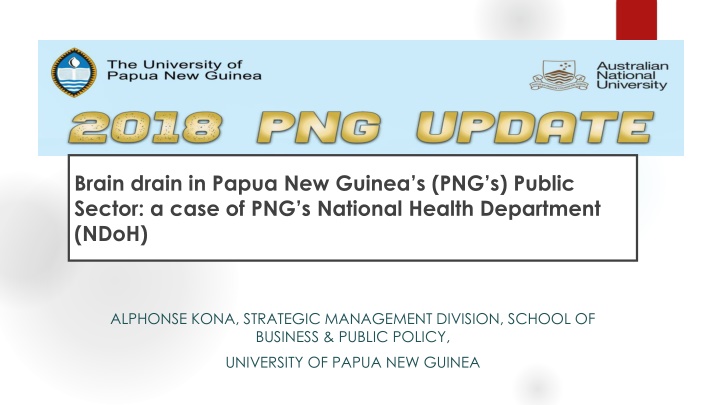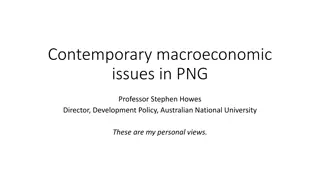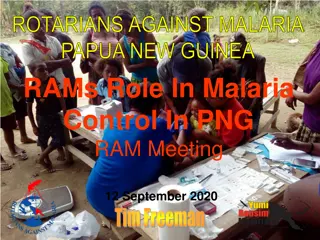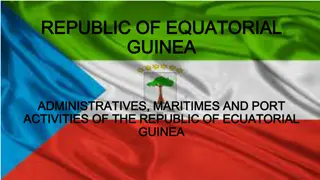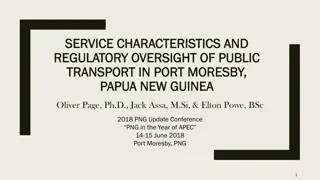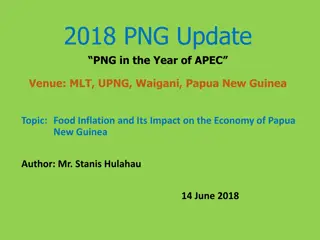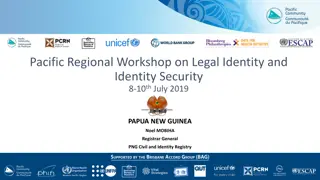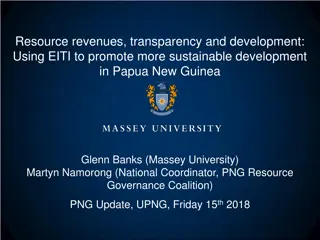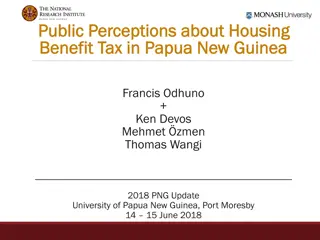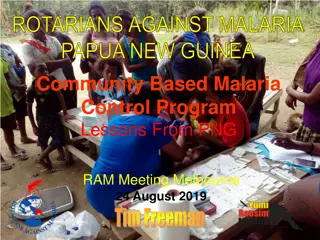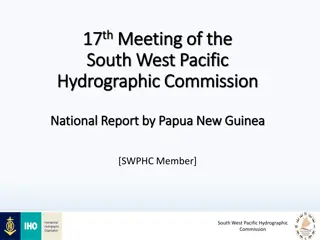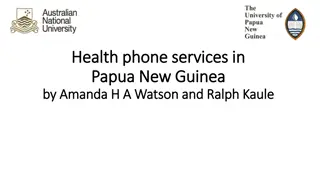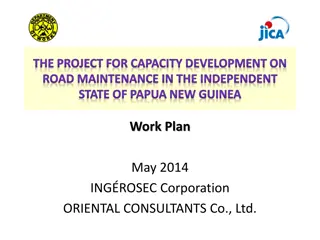Addressing Brain Drain in Papua New Guinea's Public Sector: A Focus on the National Health Department
Brain drain in Papua New Guinea's National Health Department (NDoH) is impacting the retention of health professionals due to uncompetitive conditions, lack of equipment, and cultural factors. This article explores the causes and proposes solutions such as increasing salaries, providing necessary equipment, and implementing security measures to retain skilled workers.
Download Presentation

Please find below an Image/Link to download the presentation.
The content on the website is provided AS IS for your information and personal use only. It may not be sold, licensed, or shared on other websites without obtaining consent from the author.If you encounter any issues during the download, it is possible that the publisher has removed the file from their server.
You are allowed to download the files provided on this website for personal or commercial use, subject to the condition that they are used lawfully. All files are the property of their respective owners.
The content on the website is provided AS IS for your information and personal use only. It may not be sold, licensed, or shared on other websites without obtaining consent from the author.
E N D
Presentation Transcript
Brain drain in Papua New Guineas (PNGs) Public Sector: a case of PNG s National Health Department (NDoH) ALPHONSE KONA, STRATEGIC MANAGEMENT DIVISION, SCHOOL OF BUSINESS & PUBLIC POLICY, UNIVERSITY OF PAPUA NEW GUINEA
Outline Introduction Brain drain in PNG s NDoH Causes of brain drain in PNG s NDoH Possible ways to address brain drain Conclusion
Introduction - Background PNG population about 7.8 million (UN Statistic Division, 2017) 85% live in rural & remote places (UNDP, 2012) Less number of health workers serve in rural/remote places About 50/400 medical doctors serve in rural places of PNG (Hicky-Jones, 2016) PNG s Public Sector (esp. NDoH) experiences its share of brain drain
Brain drain in PNGs NDoH NDoH reported in its 2012 Human Resource Management (HRM) Policy that (PNGNDoH, 2012, p. 11): Because uncompetitive, the sector has not been able to retain its experienced workforce. Health professionals, especially doctors and nurses, are leaving the public sector for the private sector with some migrating from PNG in favor of overseas employment. The attrition from the public sector has recently escalated as civil servants opt to join the Liquid Natural Gas (LNG) project. Specialist training overseas does not always reflect the realities of PNG resulting in highly trained PNG nationals remaining in developed comparatively better equipped. Specialist health workers tend to prefer to work in the private sector which pays better and is better equipped. the conditions of service for health workers are country institutions that are
Causes of brain drain in PNGs NDoH Unattractive Employment Conditions. e.g. housing allowances low compared to private sector (Wangi, Ondopa & Eugene, 2017) Lack of better health equipment Cultural factors (tribal fights, many people to feed etc.) Lack of Public Service Motivation (PSM) Some public servants may serve the interest of the public (Perry & Wise, 1990; Rainey & Steinbauer, 1999) While others may serve their own interest (Kjeldsen, 2012; Perry & Hondeghem, 2008).
Possible ways to address brain drain in PNG s NDoH Increase salaries Build accommodations Have necessary h/equipment in hospitals, health centres/clinics Provide security to health workers Scholarship recipients should sign contract to return to PNG and service in public service for certain number of years Identify grades 10/12 leavers from communities and train them to serve in their communities.
Conclusion Brain drain is a soft complex problem where it needs to be analysed and addressed holistically Unless necessary corrective measures are taken, brain drain in PNG s public service will continue And possible actions include having scholarship recipients sign contract to service in public service after completion of their studies and training grades 10/12 leavers in health and other fields who should return to serve their communities.
Questions Do you think public servants in PNG are public interest serving or self-interest serving individuals? Is brain drain a result of public serving or self-serving interests? Questions/Comments?
References Hicky-Jones, M. (2016). Service Delivery Series: Part 1 Challenges of Delivering Health Services in Remote Areas in Papua New Guinea and Australia. Retrieved from https://auspng.lowyinstitute.org/publications/challenges-delivering-health- services-remote-areas-australia-and-papua-new-guinea Kjeldsen, A. M. (2012). Dynamics of public service motivation: Aarhus UniversitetAarhus University, Aarhus BSSAarhus BSS, Institut for StatskundskabDepartment of Political Science. PNGNDoH. (2012). Health Sector Human Resource Management policy. Retrieved from http://www.health.gov.pg/publications/HRMPolicy_2016.pdf Perry, J. L., & Hondeghem, A. (2008). Directions for future theory and research. Motivation in public management: The call of public service, 294-313. Perry, J. L., & Wise, L. R. (1990). The motivational bases of public service. Public administration review, 367-373. Rainey, H. G., & Steinbauer, P. (1999). Galloping elephants: Developing elements of a theory of effective government organizations. Journal of public administration research and theory, 9(1), 1-32. UNDP, 2012. Annual Progress Report Papua New Guinea. Retrieved from http://www.pg.undp.org/content/dam/papua_new_guinea/docs/povred/UNDP_PG_UN%20PNG%20Annual%20Progress%20 Report%202012.pdf United-Nations-Statistics-Division. (2017). World Statistics Pocket Book - Papua New Guinea. Retrieved from http://data.un.org/CountryProfile.aspx?crName=papua%20new%20guinea Wangi, T., Ondopa, J., & Eugene, E. (2017). HOUSING ALLOWANCE FOR PUBLIC SERVANTS IN PAPUA NEW GUINEA: DOES IT MEET HOUSING AFFORDABILITY CRITERIA? . The National Research Institute, 10(3), 1-3.
